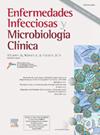西班牙对艾滋病毒相关慢性炎症和心血管风险的认识、态度和做法
IF 2.6
4区 医学
Q3 INFECTIOUS DISEASES
Enfermedades infecciosas y microbiologia clinica
Pub Date : 2024-11-01
DOI:10.1016/j.eimc.2023.07.005
引用次数: 0
摘要
背景正在接受抑制性抗逆转录病毒治疗的艾滋病病毒感染者(PWH)患有与炎症相关的慢性并发症,主要是心血管疾病。然而,由于缺乏有关 PWH 炎症的具体证据,临床指南并未就这一问题的管理提出建议。迄今为止,医生对 PWH 炎症的认识仍不明确。我们分析了传染病专科医生(IDS)/实习医生与其他直接治疗炎症(风湿病医生)或其心血管后果(心脏病医生)的专科医生相比,对炎症的相关知识、态度和实践(KAP),尤其是在 PWH 的临床管理中。405名参与者(每个专业135名医生)完成了调查,调查按西班牙地理位置、医院规模和接受治疗的PWH人数进行了分层(仅限于IDS/实习医生)。结果 治疗PWH的IDS/实习医生在炎症知识方面的得分高于心脏病学家和风湿病学家(满分8分,分别为5.5 ± 1.4分 vs. 5.2 ± 1.3分和4.6 ± 1.4分;p <0.05)。尽管如此,风湿免疫科医生对炎症表现出最积极的态度(即生物标记物监测、抗炎药物处方和心脏科医生转诊),其次是心脏科医生和内科医生(16 分中的 13 ± 3 分 vs. 11 ± 3 分和 10 ± 3.3 分;p <0.05),与医院规模和工作年限无关。大多数 IDS/实习医生(59%)将炎症纳入其治疗建议中。结论我们的研究结果表明,与其他专科医生相比,传染病专科医生/实习医生对艾滋病感染中的炎症具有较高的认识,但由于缺乏科学证据来依据炎症标志物做出决定,因此治疗意义不大。研究结果表明,需要更多的证据来监测和治疗艾滋病感染者的炎症。本文章由计算机程序翻译,如有差异,请以英文原文为准。
Knowledge, attitudes and practices in HIV-related chronic inflammation and cardiovascular risk in Spain
Background
People with HIV (PWH) in suppressive antiretroviral treatment suffer from chronic inflammation-related comorbidities, mainly cardiovascular diseases. However, given the lack of specific evidence about inflammation in PWH, clinical guidelines do not provide recommendations for the management of this issue. To date, physician awareness of inflammation in PWH remains unclear. We analyzed the knowledge, attitudes, and practices (KAP) related to inflammation, particularly in the clinical management of PWH, of infectious disease specialists (IDS)/internists compared to other specialists treating inflammation directly (rheumatologists) or its cardiovascular consequences (cardiologists).
Methods
A committee of IDS/internists treating PWH, cardiologists, and rheumatologists designed the KAP questionnaire. The survey was completed by 405 participants (135 physicians per specialty) stratified by Spanish geography, hospital size, and number of PWH under care (IDS/internists only).
Results
IDS/internists treating PWH scored higher than cardiologists and rheumatologists on knowledge of inflammation (5.5 ± 1.4 out of 8 points vs. 5.2 ± 1.3 and 4.6 ± 1.4 points, respectively; p < 0.05). Nevertheless, rheumatologists showed the most proactive attitude toward inflammation (i.e., biomarkers monitoring, anti-inflammatory drug prescription and cardiologist referral), followed by cardiologists and IDS/internists (13 ± 3 of a total of 16 points vs. 11 ± 3 and 10 ± 3.3 points, respectively; p < 0.05), irrespective of hospital size and years of experience. Most IDS/internists (59%) include inflammation in their therapeutic recommendations. However, in IDS/internists treating PWH, we observed a negative correlation between years of experience and concern about the clinical consequences of inflammation.
Conclusion
Our findings show that, compared to other specialists, infectious disease specialists/internists have high knowledge about inflammation in HIV infection, but, in the absence of scientific evidence to base their decisions on inflammatory markers, the therapeutic implications are scarce. The results support the need for more evidence on the monitoring and treatment of inflammation in PWH.
求助全文
通过发布文献求助,成功后即可免费获取论文全文。
去求助
来源期刊
CiteScore
2.10
自引率
8.00%
发文量
194
审稿时长
29 days
期刊介绍:
Hoy está universalmente reconocida la renovada y creciente importancia de la patología infecciosa: aparición de nuevos agentes patógenos, de cepas resistentes, de procesos con expresión clínica hasta ahora desconocida, de cuadros de una gran complejidad. Paralelamente, la Microbiología y la Infectología Clínicas han experimentado un gran desarrollo como respuesta al reto planteado por la actual patología infecciosa. Enfermedades Infecciosas y Microbiología Clínica es la Publicación Oficial de la Sociedad Española SEIMC. Cumple con la garantía científica de esta Sociedad, la doble función de difundir trabajos de investigación, tanto clínicos como microbiológicos, referidos a la patología infecciosa, y contribuye a la formación continuada de los interesados en aquella patología mediante artículos orientados a ese fin y elaborados por autores de la mayor calificación invitados por la revista.

 求助内容:
求助内容: 应助结果提醒方式:
应助结果提醒方式:


